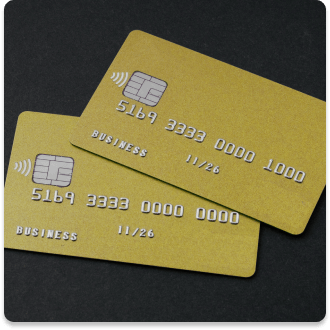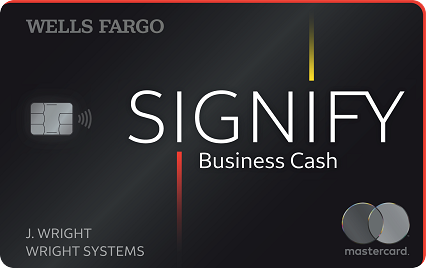
How to get a business
credit card
If you’re a business owner looking for a tool to help pay for and track business expenses, a business credit card may be the solution. Business credit cards function mostly the same as personal credit cards, but with slight differences in their qualifications and features. For example, most business credit cards allow you to add a certain number of employees to the account. This allows you to more easily manage your business purchases.
There are different types of business credit cards, too, including those that offer a rewards program and those that also function as cash back cards. Some cards are geared for sole proprietorships or startups, while others can accommodate growing businesses.
In order to help you find the best business credit card for your needs, here’s what you need to know about how they work and how to qualify for one. You’ll also see some of the benefits that credit card companies offer.
Who qualifies for a business
credit card?

To qualify for a business credit card, you must be a business owner or authorized to make financial decisions for an established business.
This means that if you’re part of the gig economy, do freelance work, are self-employed, or have an LLC, you could qualify as a business owner as far as credit providers are concerned. In short, anyone who is trying to run a business—whether it’s out of your garage or on a social media platform like TikTok—can qualify for a business credit card, assuming they meet the card’s other requirements.
Does personal credit impact your chances for a business card?
When you apply for a business credit card, your personal credit history plays a part in the issuer’s decision. If you have a bad or limited credit history, some issuers may disqualify you. However, there are business credit cards available for people at different credit levels.
The reason your personal credit score matters is because the credit issuer wants reassurance that if your business fails, you’ll be able to meet the debt obligation.
It’s important to research card options to see which ones you are most likely to qualify for. For example, some cards may have a high minimum credit score requirement. Others may advertise more flexible qualifications for people with bad credit or limited credit histories.

Consider your business needs
before you apply

When exploring various business credit card offers, you’ll want to find one that matches your business level, spending habits, and your needs. Let’s take a closer look at those factors.
Business size
Some business credit cards are designed for small business owners and solo practitioners, while others may have features that benefit larger organizations.
For example, if you need in-depth expense reporting, dozens of employee cards, and the ability to set and monitor spending limits, you may find that specific cards provide those tools. However, if you are a freelancer who wants a simple business credit card to keep expenses separate from personal spending, then you may not need those additional features.
Most common business expenses
Many business credit cards offer a rewards program that aligns with certain categories of spending. For example, if you plan to use the card to pay for shipping costs, internet service, or online marketing, you may find a card that provides bonus rewards for those categories.
If you’ll use your card primarily to book business travel, then a business credit card with travel rewards may make the most sense. In addition to earning bonus rewards points on qualifying travel bookings, you may get benefits like no foreign transaction fees or access to special perks within airports like access to special lounges.
If your spending is more general, you may prefer a card that offers a flat-rate cash back percentage on eligible purchases. With these cards, you can redeem earnings as outlined in the terms. Most provide the option to redeem your cash back as a statement credit, and others may allow you to redeem it for gift cards.
Level of spending
Just like with personal credit cards, business credit cards may have an annual fee. Typically, you’ll pay an annual fee if the card you choose is considered a “premium” option, which means it may offer VIP-level perks and benefits like airport lounge access. It may also have higher percentage cash back rates.
Likewise, some cards offer a sign-up bonus. This is usually paired with a minimum spending requirement for the first few months of when you open the account.
Compare these types of card offers to help you find a product that’s well matched to your spending habits.

What information do I need for
a business credit card
application?

When applying for a business credit card, you will need to provide both personal and business information to the card issuer. The personal information section is similar to what you’d share on a consumer credit card. The issuer will also pull your personal credit report, which creates a hard inquiry on your credit. For the business part of the application, you’ll have to verify your business status and your cash flow. The following is a list of information you may need for a business application.
Personal information
- Contact information (Name, address, phone number, email)
- Social Security number (SSN)
- Total gross income (the total of any income you bring in, even from outside of the business)
Business information
- Legal Business name
- Business name or “doing business as” (DBA) name
- Business address
- Location of business registration
- Business classification (sole proprietor, partnership, LLC, corporation)
- Industry/type of business (retail, education, etc.)
- Federal Tax Identification number (Tax ID) or Employer Identification Number (EIN)
- Ownership percentage
- Number of employees
- Age of business
- Business annual revenue
- Business expenses
Depending on the credit card issuer, you may be asked to share additional information or documentation after you submit your application. This may include business tax returns, pay stubs, or bank statements.
Tip: Applying for a business credit card with a bank that you already have a business bank account with may help streamline the application process.

What are the benefits of a
business credit card?

Business credit cards have unique benefits when compared to personal credit cards. These features are intended to help companies or independent contractors manage their cash flow and business expenses and earn rewards on their spending.
Tip: Business credit cards can also help you build your business credit score, which can be helpful if you plan to pursue other types of business financing, such as a line of credit from other lenders. Just as consumer activity is reported to credit bureaus, there are organizations that keep track of your business credit history.
Low introductory APR
Business credit cards sometimes provide a low introductory Annual Percentage Rate (APR) offer. This may be helpful to businesses that may have to make a large purchase, such as new equipment or merchandise. With a lower APR, you’ll pay no interest or low interest on new purchases for a limited time.
Rewards
Business credit card rewards can help you earn cash back or rewards points on your business expenses, such as purchases from office supply stores or travel accommodations. You may be able to earn rewards points that you can redeem for free flights and hotel stays, or cash-back rewards to offset some of your spending.
Higher credit limit
One of the key benefits of a business credit card tends to be a higher credit limit. Credit issuers understand that a business will likely do a higher level of spending than individual cardholders, and they therefore offer higher starting credit limits on these cards. The limits are set based on creditworthiness and business status, but over time and with a strong payment history, you may receive an increase or be able to request one.

Is a business credit card right
for you?
For anyone who owns a business, a business credit card can be a valuable tool to have in your arsenal. In terms of accounting and bookkeeping, it can help you keep track of your business expenses in one place, and help you manage your employee spending.
In addition to helping you stay organized, a business credit card also extends your spending power in times where you may be experiencing cash flow interruptions. This can help you stay agile and take advantage of opportunities, without having to wait on payments from your customers.
Also, if you choose a business credit card that offers a rewards program and any additional benefits, you may be able to squeeze even more value from your business spending.




